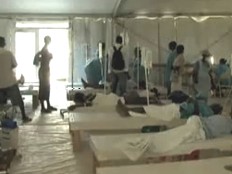|
||||||||||||||||||
| Download the revised decree and electoral calendar, published in the official journal |
|
|
Haiti - Cholera : Reassuring speeches that do not correspond to reality 11/05/2012 14:04:13
The number of patients treated by MSF in the capital has quadrupled in less than a month to reach 1.600 case last April. Treatment centers of MSF in Léogâne and Port-au-Prince have already increased their capacity to care while other sites are preparing to reopen. Last year, nearly 200,000 cases of cholera were reported in the country during the rainy season between May and October. One can also note that the fatality rate is rising: it was 2.23 per 100 cases in 2010, it is more than 3 this year said Thierry Goffeau, head of mission of MSF France in Haiti. In many areas, health facilities of the Ministry of Health and Population (MSPP) are unable to meet seasonal fluctuations of the epidemic. For Gaëtan Drossart, MSF Head of Mission: "Too little has been done in the field of water and sanitation to believe that it will not start in 2012. It is worrying that the authorities are not better prepared and keep reassuring speeches that do not correspond to reality. There are many meetings between the government, the UN and its humanitarian partners, but few concrete solutions." A study conducted by MSF in the Artibonite department, where about 20% of cases of cholera have been recorded in the country, also found a marked reduction of actions that could stop the epidemic since late 2011. More than half of stakeholders present last year are gone. In some health centers, drug stocks are empty and some staff had not received salaries since January. According to Maya Allan, MSF epidemiologist: "The rainfall is one of the factors that increase the risk of contamination. but once it stops raining, cholera back, funding stop and projects are interrupted until the next rainy season instead of being redirected to prevention. Result: the population is still vulnerable when the epidemic starts again. According to a survey conducted in April 2012 by the National Drinking Water and Sanitation (DINEPA) inside the camps where are still living nearly half a million people displaced by the earthquake of January 2010, less than a third are still supplied with water and 1% have recently received soap. "Why make recommendations to the public health if it is not able to apply them?, wonders Gaëtan Drossart. It is urgent to give people the material means to protect themselves against cholera." Vaccination may help control the disease, especially in areas most at risk, but it's not a miracle solution. The immunity conferred by the existing vaccine is limited to 3 years with an efficiency estimated at 70%. Only sustainable projects in the fields of water and sanitation, long to implement, will overcome the epidemic. "Today the first priority is to save lives, says Gaëtan Drossart, all health actors must be mobilized in that direction now." See also : https://www.haitilibre.com/en/news-5561-haiti-health-mutation-of-the-strain-of-cholera-in-haiti.html https://www.haitilibre.com/en/news-5588-haiti-news-some-news-here-and-there.html HL/ HaitiLibre
|
|
|
Why HaitiLibre ? |
Contact us |
Français
Copyright © 2010 - 2026 Haitilibre.com |





